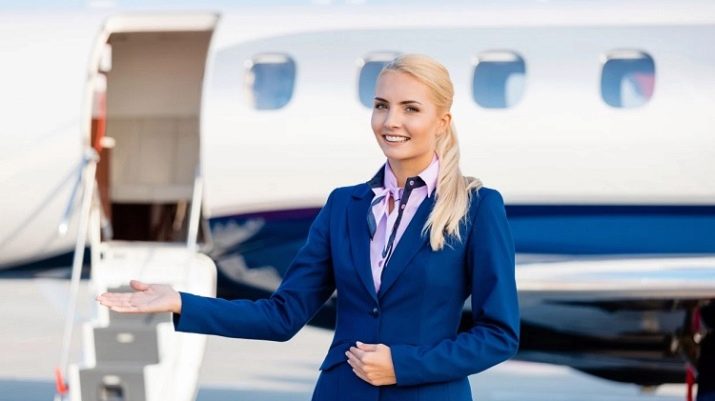Flight attendant and stewardess: description of the profession
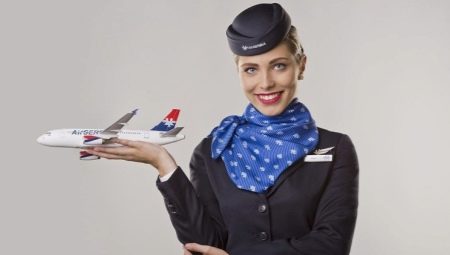
The material is devoted to the description of the profession of a flight attendant and flight attendant.
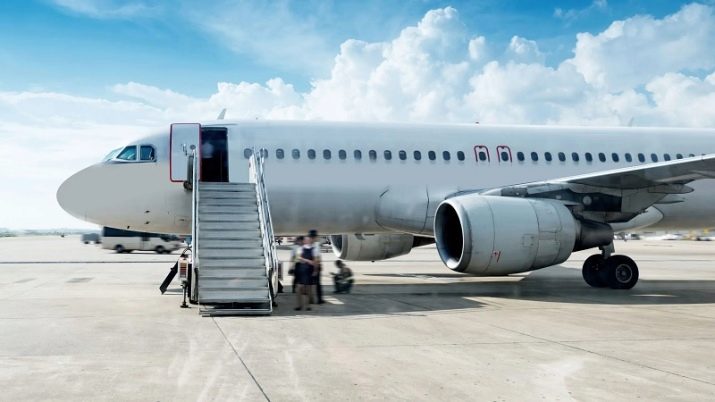
Pros and cons of the profession
It should be pointed out right away that the work of a flight attendant or flight attendant is well paid compared to many other professions. Almost any airline provides a social package. It is prestigious to work on the aircraft of Aeroflot and other large companies. The authority and popularity is even higher than that of police or government officials, construction workers or medical workers. Stewards retire early enough.
However, this very moment is associated with a serious disadvantage of professional activity. The fact that aviation specialists retire at a relatively early age is associated with significant occupational hazards. Despite the romantic halo that surrounds aviation, working in it is very exhausting and harmful to the body. Even the latest technical means only weaken, but do not completely eliminate the emerging risks. Moreover, fast flights and changing time zones, plus being constantly on your feet, are unavoidable harmful factors.
Regular travel and business trips can put an end to relationships even with the most cold-blooded relatives. Or, at least, they will constantly cause more and more conflicts. As 2020 has shown, the profession of a flight attendant is also unstable. Demand collapses can occur very abruptly and inevitably.
Another disadvantage is that even if the flights are carried out regularly (and primarily for this reason), it is extremely difficult to plan your daily life, because the instructions of the management can intervene at any time.
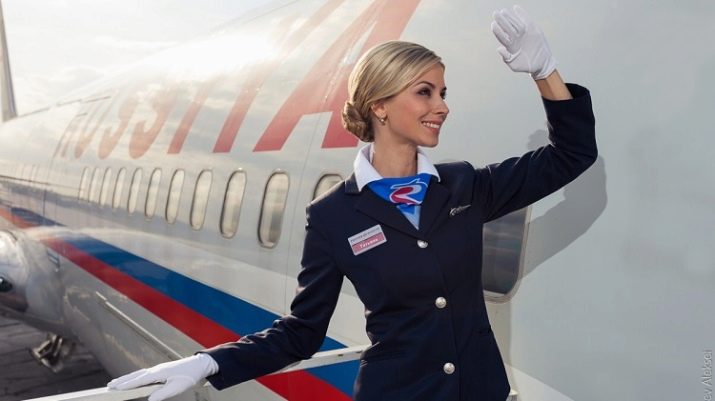
Responsibilities
From the outside it may seem that the conductor on the plane should only be polite, graceful, sociable, and even must explain different things to passengers, deliver goods and products. But this is not all that the aviation authorities require. People working in any airline are obliged to master perfectly the actions in emergency situations. Sometimes no one but them can provide first aid. If the plane urgently landed far from populated areas or crashed, it is the conductors who will have to:
- collect all passengers;
- provide the same assistance;
- coordinate self-rescue efforts.
Of course, such situations are very rare. But nevertheless, all professionals are trained for them. The fact that flight attendants wear hats and generally use strictly prescribed overalls is also no coincidence. This is both an emphasis on corporate identity and an increase in authority among passengers.
But the work that any flight attendant does does not end there either. They appear on board long before the end of boarding is announced. You will definitely have to check the order in the cabin, check if there is rescue equipment in all the required places. All problems that cannot be eliminated by hand require immediate notification of the technical service. When ticket holders begin to climb the ladder, the work moves to a new stage.
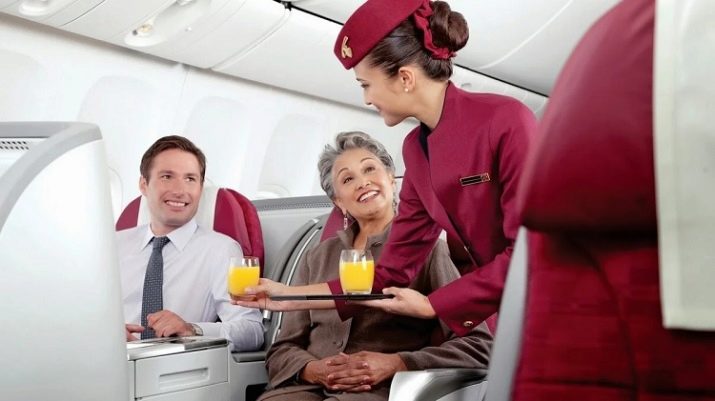
Be sure to greet everyone and help you find the right place in the salon. You also need to help place your luggage on the shelves. Everyone knows that stewards carry food and drinks during the flight. They will also have to:
- give advice on various topics;
- provide additional services (depending on the specific situation);
- resolve conflicts as far as possible;
- to be the liaison between those in the cabin and the cabin crew;
- perform flight safety procedures;
- follow emergency procedures;
- serve pilots and technicians at the same level as business class passengers;
- maintain cleanliness and order in the cabin (including those places where passengers are not allowed);
- properly operate onboard and rescue systems;
- comply with fire protection standards;
- take into account the cultural norms of different countries when communicating with the cabin crew and passengers on international flights;
- draw up the documentation necessary for the work.
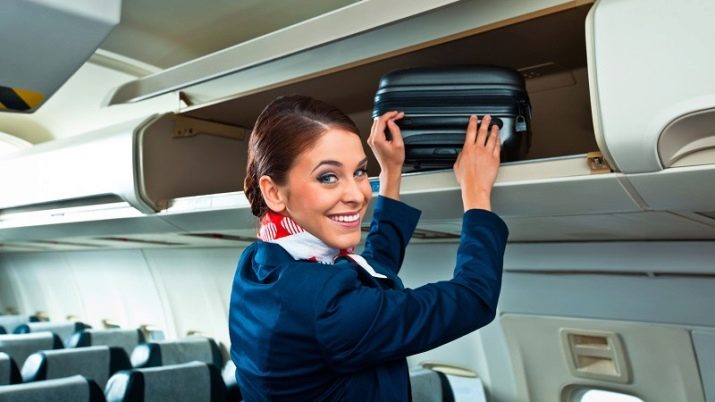
Primary requirements
Personal qualities
It is worth pointing out right away that each airline sets its own standards for what growth should be, and this is not due to the whims of directors, but to the objective requirements of aviation. The deviation from the standard parameters of height and body weight makes it very difficult to move around the aircraft cabin. And if in a normal situation this can still be theoretically tolerable (turning into only a slight deterioration in service), then in an abnormal situation it can turn into serious unnecessary troubles. What kind of people are hired, it is best to find out on the website of a particular carrier.
But the characteristics of the figure are far from all that is expected of stewards and flight attendants. Their work is accompanied by constant stress, even when there are no obvious conflict situations and disputes. Therefore, even on earth, they are trying to assess the resistance to stress and weed out candidates according to this parameter as strictly as possible. After all, on board you will not only have to maintain a balanced psyche in general, but also continue to work intensely and scrupulously, without missing any details. In the air, there is only room for disciplined people who know how to strictly adhere to plans and schedules, to adhere to them punctually.
Flight attendants must be sociable and friendly. They must find the optimal balance between caring for customers, forcing them to fulfill their requirements and underlined official politeness.
Observation is certainly required - inattentive flight attendants are hardly needed by any carrier.
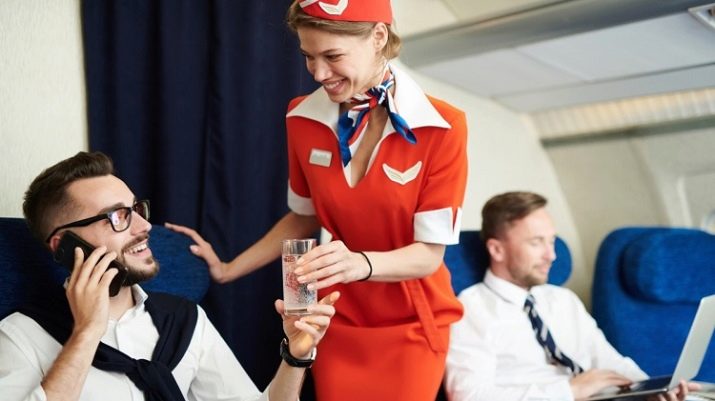
In addition, employers check:
- hearing and sight;
- ability to think quickly and make decisions;
- perception of oral speech (including fast and fuzzy);
- the ability to switch attention between several objects;
- the ability to quickly analyze data;
- emotional flexibility;
- the level of diligence;
- willingness and ability to work in a team.
We should also dwell on medical contraindications for working as a flight attendant. They are almost as wide as they are for the flight crew. It is strictly forbidden to work in this position for patients with diabetes and other endocrine disorders, even with a weak degree of severity. Naturally, the ban applies to patients with any nervous and mental abnormalities, to those who have impaired vestibular apparatus. Such a stressful profession is contraindicated for those suffering from problems with the heart and blood vessels, with the musculoskeletal system, and the respiratory system.
The list of contraindications also includes:
- seizure disorders;
- lack of coordination;
- fear of heights and / or confined spaces;
- allergic disorders;
- speech disorders;
- dermatological problems and other pathologies that negatively affect the appearance (after all, the conductor is the face of the company).

Knowledge and skills
Both women and men who wish to take up the position of flight attendant must also meet purely professional criteria. They need to master flawlessly:
- basic rules for passenger and baggage transportation;
- principles of operation of rescue equipment;
- methods of rescue in emergency situations;
- actions that allow you to remove all passengers from the plane in 90 seconds;
- completeness of life-saving appliances on board;
- English (or even better, other foreign languages);
- psychology;
- basic information about the culture, traditions, customs and the current state of the countries where you will mainly fly;
- legislation of Russia and other major states in the field of air transportation, the turnover of goods and material values.
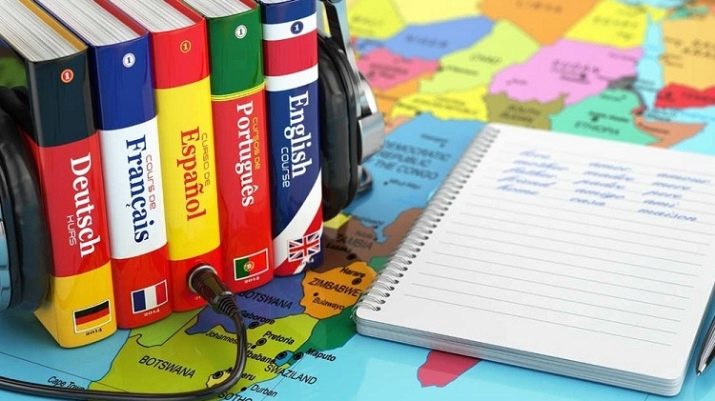
Education
As it has already become clear, in order to become a flight attendant or flight attendant, you need to meet very strict requirements. However, this does not mean that only unique intellectuals with a model appearance can occupy such a position. Even the most ordinary people have considerable chances of success, if they show the proper perseverance. Training of air personnel - both men and women - is organized in many airlines. Thus, they immediately prepare for themselves personnel ideally suited to internal requirements. Even if the training is separate from the company, it often pays for targeted training.
To get into such a training program, you will have to go through an interview and a medical commission immediately. (but then you will not have to go through them additionally). The preparation course takes from 3 to 6 months. While candidates are being trained, they are paid a corporate scholarship. However, there is also a minus - after graduation, you will have to work for 2-3 years in the same airline or pay the full cost of training in case of premature dismissal. True, for many people this is, rather, not a minus, but a plus: a guaranteed device and the opportunity to immediately demonstrate their skills. If you have free personal funds, you can enter the "School of flight attendants". Even those who have not passed a corporate interview are taught there. There are several such schools, including the civil aviation universities in Moscow and St. Petersburg, and the training center in Vnukovo. The cost of training is 40-60 thousand rubles.
It is often mentioned that graduates of such courses are almost guaranteed to get an aerial job. However, not everything is so simple - in addition to getting an education, you will also have to pass additional corporate exams and fly 30 hours with instructors on real aircraft.Higher education is not required for stewards, but it dramatically increases the chances of finding a job.
In addition, the combination of higher education, training in corporate courses and proficiency in English makes it possible to take international flights. Those who do not meet these requirements are allowed only to the internal Russian message, which is much less prestigious and worse paid.
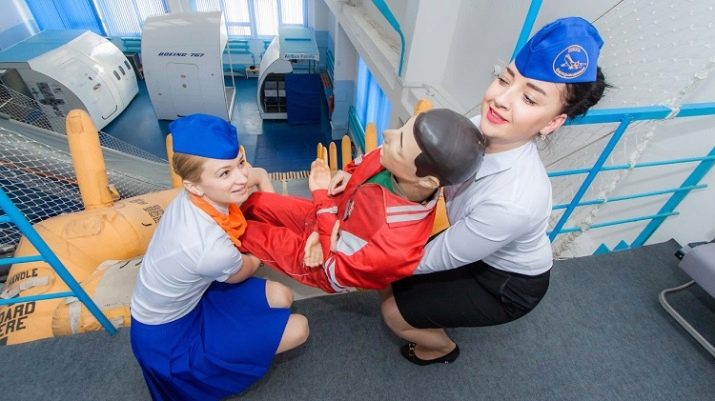
Entering the Vnukovo training center, you will have to pay at least 48,000 rubles. Important: to enter there, you must at least graduate from school in the volume of 11 classes - while candidates both under 19 and after 25 years old will be screened out. Those who pass the "sieve" of selection and medical examination will have to study for 3 months. It is worth considering that at Vnukovo they teach only those registered in Moscow and in the Moscow region, and necessarily - citizens of the Russian Federation. The cadets use simulators and look for work on their own.
The training center of the S7 carrier charges 45,000 rubles. But those who agree to work for a certain period of time on board the company will be able to study for free and even receive a scholarship. Applicants must be at least 18 years old. As in the previous case, it is required to graduate from school. The conditions for training at Aeroflot are somewhat different:
- when applying for a job in the company itself, you do not need to pay for training, but the fee will be deducted for some time from the salary;
- preparation time - 45 days;
- real training flights are provided;
- citizens of Belarus can be considered as candidates;
- only those who have at least secondary specialized education are admitted to courses.
If a graduate, after completing his studies at the Aeroflot Aviation School, wants to get a job with another airline, then he will have to pay at least 60 thousand rubles for training. Among secondary educational institutions there is only a civil aviation school in St. Petersburg. Requires USE certificates in Russian and literature.
You can also take subjects such as mathematics and Russian in the entrance examinations. This is done at the request of the contestants. Another option - also in St. Petersburg - is the training center of the Federal Air Transport Agency.
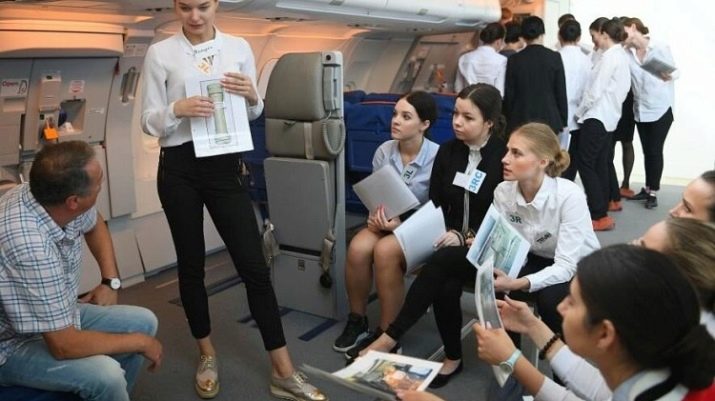
The salary
Usually, novice flight attendants in Russia earn from 15 to 20 thousand rubles. As mentioned, tuition costs can be deducted from this amount, so that the actual monthly pay is sometimes even lower than the average. However, as experience is gained, the situation is corrected. Some experienced air conductors have an income of more than 80,000 rubles. Salaries at Aeroflot start at 40,000 rubles.
After gaining experience there, it will be possible to apply for payment of $ 1500-1800 (but this is on external flights at the current rate). In the internal communication, the rates are more modest. It is worth noting that flight attendants are paid based on the region of residence. So, in the Altai Territory, the average rate is 150,000 rubles. In the Krasnoyarsk Territory, stewards receive 120 thousand rubles, in the Moscow region - 106, in Tatarstan - 86, and in the Altai Republic - only 65 thousand.
Other carriers provide this picture:
- Utair - up to 30 thousand;
- S7 - from 25,000 to 70,000;
- Pobeda - about 50,000 rubles for experienced employees.
Abroad, the situation is as follows (in rubles at the exchange rate at the beginning of 2021):
- in Kazakhstan - 120 thousand;
- in the USA - about 200 thousand;
- in Germany and Great Britain - about 150 thousand.
In addition to material rewards, you can count on other incentives. Many firms offer substantial discounts to staff on their tickets. Voluntary health insurance is often paid for. Compensations may be provided for meals and temporary accommodation at the arrival points. Also, air personnel are usually guaranteed a vacation of 70 days.
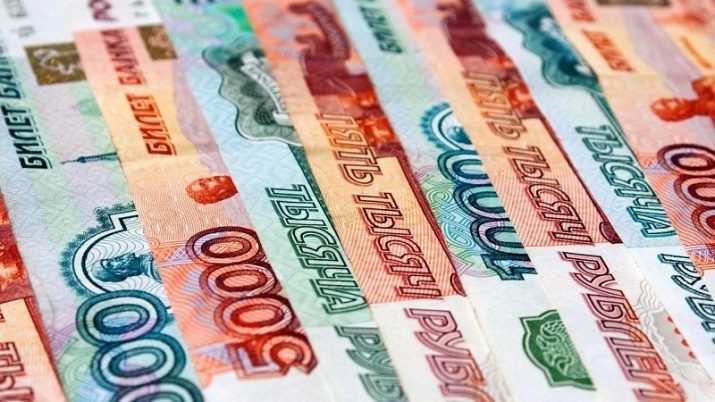
Career
It mostly takes place within the profession. For example, you can switch from regional flights to national, and then to intercontinental flights. Or start serving not budget passengers, but business class. Or move to a more established airline. Some air conductors become chiefs of administrative services (but this is a fundamentally different kind of activity).
Conclusion: career growth, if there is, it is rather conditional.
Review overview
The flight attendants themselves are ambiguous about their work. Many of them say that the pay does not match the complexity of the functions performed. The biggest objective disadvantage, in addition to various dubious decisions of the management, is a completely unpredictable schedule. The time gap from landing to takeoff is often filled with corporate training. The rules of work are very complex and often contradict each other.
At the age of 40, when the visual appeal is no longer the same, flight attendants are often "squeezed" from their posts. The advantage is formal employment. The salary is really good by domestic standards.
Much depends on luck (which colleagues and pilots will come across). In many cases, passengers are treated very badly.
